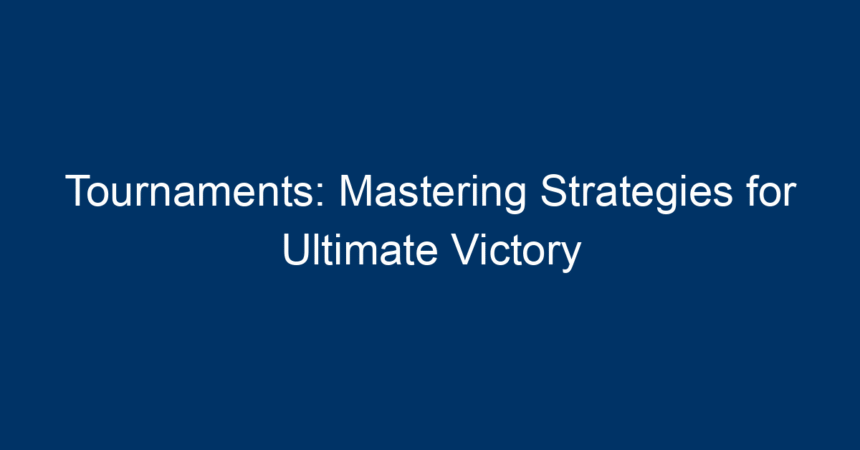In a world that thrives on competition, tournaments stand out as the ultimate showcase of skill, strategy, and endurance. From esports and traditional sports to board games and card games, tournaments bring together passionate contenders vying for glory. But how do the champions consistently rise to the top? The key lies in mastering strategies tailored for every level of competition. This article delves into the intricacies of tournament strategies and offers actionable insights for anyone wishing to achieve ultimate victory.
Understanding the Tournament Landscape
Before diving into strategies, it’s crucial to understand the different types of tournaments. These can vary widely based on format, type of game, and ruling mechanisms:
Types of Tournaments
-
Single Elimination: This format pits players against each other in knockout rounds. A single loss eliminates a contender from the competition.
-
Double Elimination: Similar to single elimination, but players have a second chance following a loss, allowing them to compete in a lower bracket.
-
Round Robin: Each participant competes against every other competitor, and rankings are determined by win-loss records.
-
Swiss System: Participants are paired in each round based on previous results, ensuring that contenders with similar records face off against one another.
- Grid or Ladder: These formats allow participants to challenge others at their own skill level, gradually climbing to the top.
Understanding these formats can help you tailor your strategies according to the tournament structure, maximizing your chances of victory.
Pre-Tournament Preparation
Preparation is the foundation of success in any tournament. Here’s how to gear up effectively.
1. Research Your Opponents
Knowledge is power. Understanding your opponents’ strengths, weaknesses, and play styles can make a significant difference in your approach. Analyze their past games, identify patterns, and adapt your strategies accordingly.
2. Sharpen Your Skills
Regular practice is essential. Focus on refining your skills in areas that are likely to be tested during the tournament. Utilize drills, simulations, and friendly matches to enhance your gameplay. This is particularly important in fast-paced environments like esports, where split-second decisions can lead to victory or defeat.
3. Plan Your Strategies
Develop a strategic plan based on the tournament format and your expected opponents. Consider diversifying your strategies to keep your gameplay unpredictable. For instance, using aggressive tactics in one match and defensive approaches in another can confuse opponents and give you an edge.
In-Tournament Strategies
As you enter the tournament arena, having a solid plan in place is crucial for adapting on the fly. Here are essential in-tournament strategies to consider:
1. Adaptability
Flexibility is key. Even the best-laid plans may need adjustments based on unforeseen circumstances—like an opponent’s unconventional strategy or unexpected game dynamics. Stay alert and be prepared to pivot your strategy to counter real-time challenges.
2. Psychological Warfare
The tournament environment can be intense. Utilize psychological strategies to gain an advantage. This could involve bluffing in card games or maintaining a calm demeanor against aggressive opponents. Building a psychological edge can disrupt opposing players’ focus and confidence.
3. Communication
If you’re part of a team, effective communication is vital. Ensure that all team members are clear on roles and strategies, and establish signals or code words for in-game decisions. Consistent communication can drastically improve teamwork and execution.
4. Time Management
Whether in a physical sport or a time-limited game, managing your time during a tournament can be the difference between success and failure. Keep track of your pacing, ensure you’re not rushing into decisions, and allocate appropriate time for planning and executing strategies.
Post-Tournament Analysis
No tournament is complete without a thorough review of your performance. Understanding what worked and what didn’t is fundamental for improvement.
1. Review Game Footage
If possible, record your matches and analyze them later. This allows you to spot mistakes, assess your strategies, and evaluate your overall performance. Look for patterns in decision-making and areas where you can improve.
2. Gather Feedback
Seek input from coaches, teammates, or even opponents. Constructive criticism can provide useful insights into how you can improve. Remember, winning is great, but the journey of growth is what truly matters.
3. Set Goals for Future Tournaments
Based on your analysis, set SMART (Specific, Measurable, Achievable, Relevant, Time-Bound) goals for your next tournament. Whether it’s improving a specific skill, mastering a new tactic, or simply enhancing your mental game, having clear objectives will help you focus your training.
Conclusion: The Path to Mastery
Mastering tournament strategies requires a blend of preparation, adaptability, and self-analysis. Whether you’re participating in single elimination esports tournaments or round-robin setups for traditional sports, understanding the nuances of tournament play can significantly impact your performance.
Actionable Insights:
-
Do Your Homework: Research your opponents and the tournament format.
-
Practice Consistently: Regular training is essential for skill refinement.
-
Stay Flexible: Adapt your strategies based on real-time challenges.
-
Communicate Effectively: Clear lines of communication can enhance teamwork.
- Analyze and Improve: Learn from every tournament experience to continually advance your game.
By following these strategies, anyone can develop a competitive edge in tournaments. Remember, the journey toward mastery is ongoing, but with each tournament, you inch closer to ultimate victory. Embrace the challenge, and let your passion for competition propel you forward!




